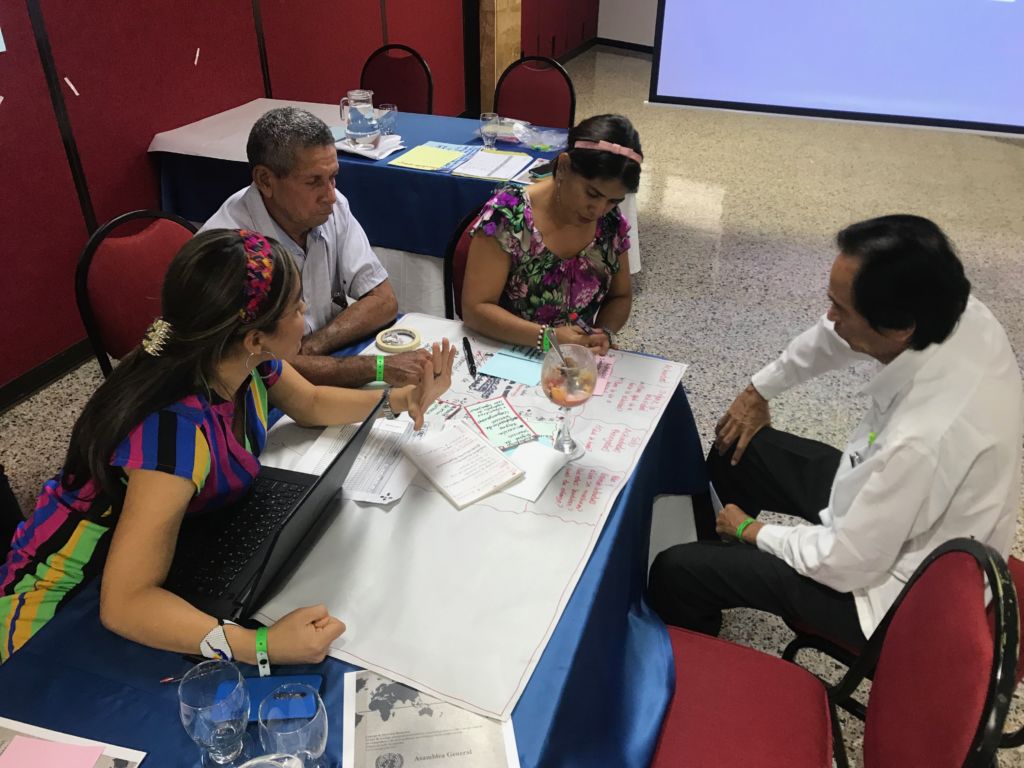On April 29, USAID’s Center of Excellence on Democracy, Human Rights and Governance; the Aga Khan Foundation (AKF); and the FHI 360-led Strengthening Civil Society Globally (SCS Global) program hosted an event on Integrating Local Philanthropy into the Journey to Self-Reliance. During one of the breakout sessions, one of the participants asked, “Has anyone done research on this?”
We have.

About FFS: The Facilitating Financial Sustainability (FFS) program, jointly conducted by LINC, Peace Direct, and Foundation Center, was launched in 2017 to develop and test ways that different actors (including donors, policymakers, intermediary organizations, and CSOs themselves) can work together to improve the factors that drive local organizations’ financial sustainability in different development contexts. As part of the United States Agency for International Development (USAID) Local Works program, FFS uses a combination of research and on-the-ground testing of approaches to improve local organization financial sustainability to support the Local Works goal of enabling local communities to drive their own development.
Our research examines the factors that underlie successful CSO financial sustainability approaches for organizations in six countries: Bosnia and Herzegovina (BiH), Colombia, Democratic Republic of Congo (DRC), Mexico, Philippines and Uganda. Our research combines qualitative analysis from in-depth interviews with CSOs and funders, as well as a first-of-its-kind quantitative analysis of thousands of grants supporting financial sustainability. The aim of the research is to uncover effective strategies and approaches for organizations interested in improving CSO sustainability. Out of 8 key findings, 4 are directly related to the importance of local philanthropy:
1. SOCIAL CAPITAL IS A CRITICAL ENABLER OF SUSTAINABILITY FOR LOCAL ORGANIZATIONS, ESPECIALLY IN DIFFICULT ENVIRONMENTS
Our analyses revealed the importance of Social Capital. Support from the local community in particular was cited as a key “invisible resource” underlying long-term organizational financial sustainability. Organizations mentioned how local community members can support project implementation, and organizations in challenging environments mentioned this as a critical enabler of their resilience to the inevitable ups and downs of donor funding.
Support from the local community can be just as critical to financial sustainability as more tangible resources and assets. Organizations can build local community support into their financial sustainability strategies by proactively planning to involve the community at every stage of its projects.
2. SMALL POOLS OF UNRESTRICTED FUNDING CAN BE CRITICAL FOR ORGANIZATIONAL RESILIENCE DURING DIFFICULT TIMES
Across all country contexts, CSO representatives discussed critical points in their history during which a relatively small amount of completely unrestricted funding proved critical for their resilience in the face of severe resource challenges. In many cases, this funding did not come from institutional grants, but rather from a combination of sources scraped together: staff contributions, social enterprises or small side businesses like food or guesthouses, local membership programs, Board donations, collections from local religious congregations, and crowd-funding from online sources. Though generally small in amount, the complete lack of restrictions on this funding allowed organizations to put in place structures and activities to greatly improve their financial position and expand their impact.
Using creative mechanisms to develop small pools of unrestricted funding can positively impact on organizational sustainability by providing necessary flexibility to get through difficult periods and plug important gaps in programming.
3. LOCAL FUNDERS AND INTERMEDIARY ORGANIZATIONS PLAY AN IMPORTANT BUT OFTEN-OVERLOOKED ROLE IN BUILDING SUSTAINABLE CSO ECOSYSTEMS
Interviews with CSO representatives revealed patterns among the organizations that are successfully able to mobilize resources from local funding sources. Organizations mentioned that internal governance and staff resource mobilization capacity were critical drivers of sustainability, or that they had developed a successful social enterprise model.
Local funding is still a relatively small share of overall formal grantmaking in many countries, and this funding can take many forms that often do not fit neatly into Western conceptualizations of “funder/grantee” models but plays a crucial role in developing overall sustainable ecosystems.
4. NON-FINANCIAL RESOURCES AND ASSETS CAN BE JUST AS IMPORTANT AS FINANCING IN DEVELOPING
Many successful organizations stressed the ways in which non-financial resources make a difference for achieving financial sustainability. Examples of nonfinancial resources explicitly mentioned as key drivers of sustainability include: Land and housing; Local volunteer time; and Locally-sourced in-kind goods (such as housing materials).
Hard asserts can be particularly important as a productive and stable resource to leverage, and “soft” assets such as volunteers can help reinforce community Social Capital and provide a resilient means to implement programs in difficult financial times.
For more information, you may download the full report at: http://sustainability.linclocal.org/research/
Next Steps: The next FFS team is now putting this research into practice via “Action Learning Groups” of local civil society stakeholders in three of the countries included in the research: Uganda, the DRC, and Colombia. These groups are taking these research findings as a starting point for prioritizing local barriers to sustainability and developing collective strategies and activities to undertake to help overcome some of the local barriers. The FFS team will be publishing further learning notes and guides based on this experience to help other practitioners use the lessons learned from this activity to improve their own approach towards facilitating financial sustainability.
